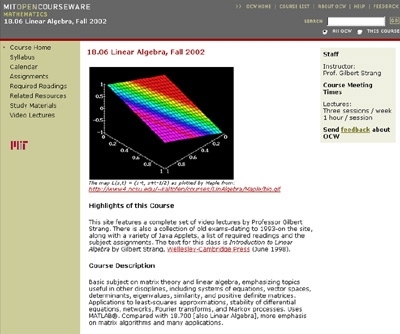With the opening of the pilot site of MIT OpenCourseWare on Monday, Sept. 30, the ambitious initiative took the first step toward fulfilling the lofty expectations it prompted when it was announced in 2001.
Thirty-two MIT courses in 16 academic departments and the Sloan School of Management are now available.
The idea behind OpenCourseWare is to make the MIT course materials used in almost all undergraduate and graduate subjects available on the web, free of charge, to any user anywhere in the world. The hope is that OCW will advance technology-enhanced education at MIT, and will serve as a model for university dissemination of knowledge in the Internet age.
"The mere fact that such an initiative is being undertaken underscores MIT's leadership in research and education," said MIT Professor of Naval Architecture Paul D. Sclavounos. "Moreover, the content of the OCW subject sites will better inform the world on the breadth and depth of the activities across the Institute. The open dissemination of educational and research information can only help in enhancing MIT's image worldwide."
When the plan was announced in April 2001, MIT received thousands of e-mails from around the world expressing enthusiasm and gratitude for OCW--a response that is still continuing.
Sclavounos' subject 13.022 (Surface Waves and Their Interaction With Floating Bodies) is among the courses that appeared in the first sampling of OCW course sites on Monday. Also launched were course sites in architecture, algebra, and electrical engineering and computer science, to name a few.
The story of how MIT found itself at the vanguard of educational technology starts in spring 2000 at a meeting of MIT's Council on Educational Technology (MITCET). The new Internet economy had reached its apex, and e-learning was a powerful buzzword on campuses and in corporate boardrooms. It seemed everyone wanted to cash in on the potential of the marriage of the Internet and higher education. MITCET was charged by Provost Robert Brown to examine MIT's position and long-term vision in the e-learning environment.
The council's resulting recommendation--to make MIT course material available on the web for free to everyone--startled even President Charles Vest. But with the public release of the first subject sites on Monday, OCW has become reality.
"We believe that with modern communication technology, we can not only transmit information but also stimulate and enhance the deeply human, person-to-person endeavor of education," Vest said.
The task of creating a highly visible web site, drawing together virtually all of MIT's course materials, is considerable. Most faculty support this effort and believe it is consistent with MIT's long-standing objective to focus the contributions of faculty on broad, societal benefits.
Professor Gilbert Strang, who has taught in the Department of Mathematics for 43 years, is one of the strongest advocates of the OCW project. His course site for 18.06 (Linear Algebra) features more than 30 video lectures that users from around the world will be able to download and watch as companions to his world-renowned textbooks, "Introduction to Linear Algebra" and "Linear Algebra and Its Applications."
"I'm happy to think that these videos will help in teaching mathematics. I hope teachers [outside of MIT] will get new ideas for their own courses. It helps to see how someone else organizes all those wonderful facts about matrices," Strang said.
It's important to remember that this initiative is still in its "discovery" phase, and will be for at least another year. OCW Executive Director Anne H. Margulies stressed that the technological infrastructure built for this pilot phase of OCW is still a work in progress.
"Although we have not yet fully designed or decided on our long-term technical architecture and systems, we're committed to using open systems and will share our approach and experiences with those who may want to launch similar efforts," she said.
As the discovery phase of OpenCourseWare continues, MIT community members are invited to share their thoughts. Comments or questions about OCW may be e-mailed to Jon Paul Potts at jpotts@mit.edu.






